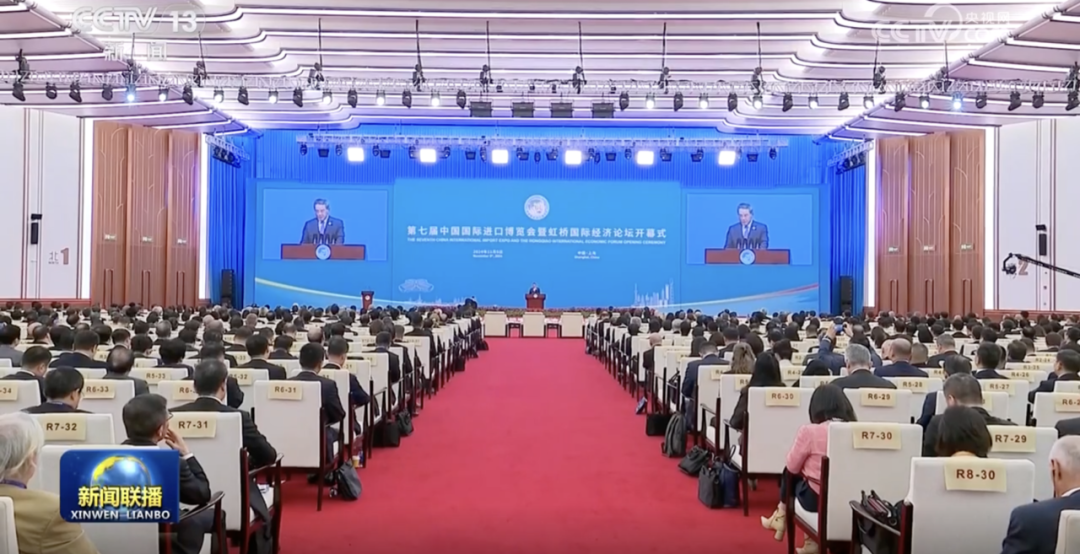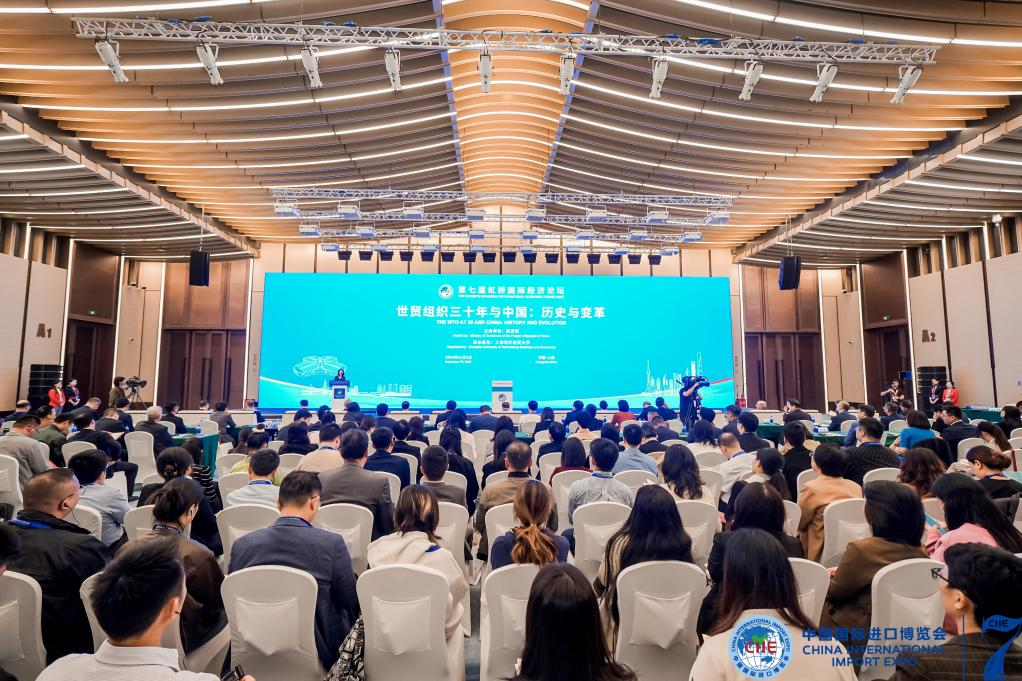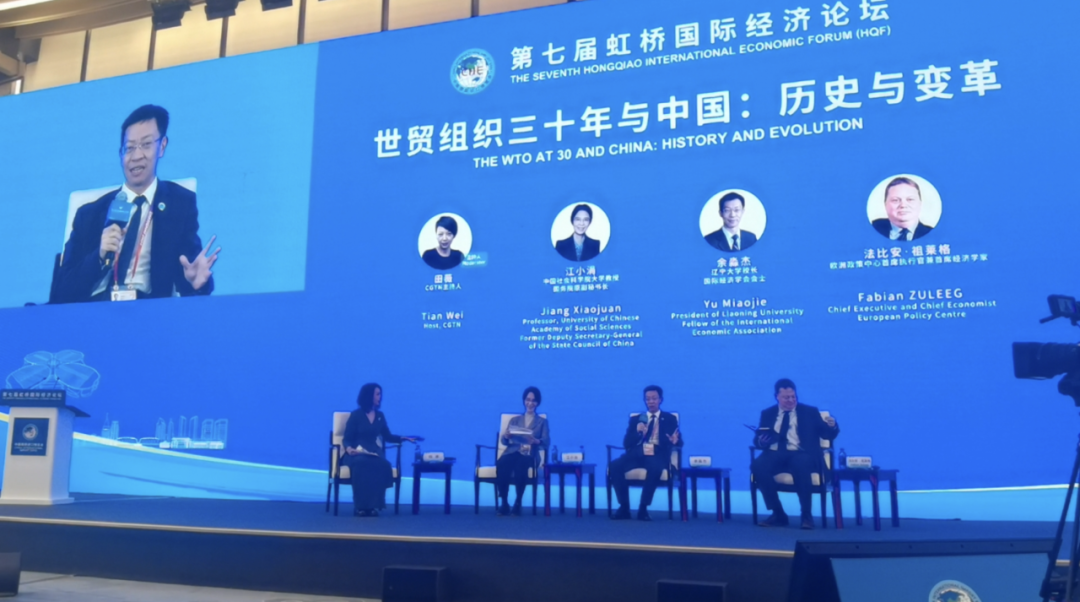On November 5, 2024, the 7th China International Import Expo (CIIE) kicked off in Shanghai. As the world’s first national-level exhibition on import, the event has been held every year since 2018. Today, it has become a window for China to build a new development paradigm, promote high-level opening up and share international public products.

On November 5, Professor Yu Miaojie, Deputy Secretary of the CPC Committee and President of Liaoning University attended the opening ceremony of the exposition and delivered a speech at the sub-forum of Hongqiao International Economic Forum, themed ‘Thirty Years of WTO and China: History and Change’.
Li Fei, Vice Minister of the Ministry of Commerce, McClay, Minister of Trade of New Zealand, Reyes, Minister of Trade, Industry and Tourism of Colombia, Zeyoudi, Minister of State for Foreign Trade of UAE, Luc Magloire, Minister of Commerce of Cameroon, Moreno, Deputy Secretary-General of UN Trade and Development (UNCTAD), Hill, Deputy Director-General of WTO and Allen, President of US-China Business Council delivered speeches online and offline respectively.

Li Fei noted that the multilateral trading system with the WTO as its core provides an open, stable and predictable institutional environment for international trade, which has effectively promoted the development of global trade and investment. He added that since China’s entry into WTO in 2001, China works actively to integrate itself into economic globalization and has become a main trading partner of more than 140 countries and regions, benefiting itself and the whole world. He noted that China will fully apply the message of the Third Plenary Session of the 20th Central Committee of the Communist Party of China (CPC) and play a more active and constructive role in the WTO. He concluded by saying that China will support the WTO to put development in a more important position and fully and deeply participate in the WTO reform by providing more global public goods and promoting the development of the global economic governance system in a more open, inclusive, balanced and win-win direction.
At the section of keynote speeches, the guests fully affirmed the positive role of the WTO in promoting global trade growth, economic development and job creation in the past 30 years. They supported the improvement of WTO functions through necessary reforms, the better promotion of the liberalization and facilitation of global trade and investment and its response to global common challenges such as climate change, scientific and technological revolution and development gaps. They called on all parties to build on the success of the past two ministerial conferences and promote the 14th WTO Ministerial Conference to be held in Cameroon in 2026 to achieve positive results. They also noted that CIIE provides a broad market for the export of products from other countries and more development opportunities for countries around the world.

At the discussion session, experts held in-depth discussions on the experience and insights of the WTO in the past 30 years, the key areas of WTO reform and China’s gradual institutional opening up. They included Jiang Xiaojuan, a professor from University of Chinese Academy of Social Sciences and former Deputy Secretary General of the State Council, Yi Xiaozhun, former Vice Minister of Commerce, Bai Ziwen, Chief Representative of the International Monetary Fund in China, Yu Miaojie, President of Liaoning University, Wang Rongming, President of Shanghai University of International Business and Economics, Carlo D’Andrea, Vice President of the European Chamber of Commerce in China, Pei Jinlin, Global Vice President of SAP, Wang Dong, Chairman of Yiwu Commodity City and Zuleeg, CEO of the European Policy Center. They noted that with the help of the WTO, the global trade in goods and services has increased from 6 trillion USD in 1995 to 30 trillion USD in 2023. They added that 55 developing economies, including China, have integrated into the multilateral trading system and benefited from it. They pointed out that it is in the common interest of all countries to carry out necessary reforms in the WTO and restore the vitality of the multilateral trading system as the WTO is facing unprecedented severe challenges. They praised that as a staunch defender and an important contributor to the multilateral trading system, China is vital to the WTO’s mission and China’s contribution to solving global challenges. Experts expect China to continue to deepen reforms in the fields of foreign investment access and supervision, intellectual property protection, state-owned enterprises and industrial subsidies to assume more responsibilities as a big country in the organization and actively participate in the reform of the global economic governance system.

Yu Miaojie noted that China’s accession to the WTO not only promotes its own development, but also benefits the whole world. He mentioned that China’s exports provide foreign consumers with more product choices and better quality, enabling them to enjoy a higher standard of living at lower prices. He added that by building a unified national domestic market and adopting other policies to promote imports, China has improved the employment environment abroad. He emphasized that the so-called ‘overcapacity in China’ is biased as it is due to insufficient effective demand, similar to the situation in which manufacturers were forced to dump milk because of insufficient demand during the Great Depression in the United States. He added that as far as capacity utilization is concerned, compared with other countries such as the United States of 77.7%, the European Union of 78.1%, Brazil of 81.6%, China stands at 79.9%, which is reasonable.
He further elaborated that China’s industrial subsidy policies do not violate WTO rules because they are effective for both export goods and domestic goods. Secondly, he noted that China’s industrial subsidies are mainly used for the research and development of green technologies. Thirdly, he said that China’s industrial subsidies benefit both domestic and foreign-funded enterprises. Finally, he noted that other countries also adopt similar industrial subsidy policies, such as the United States’ subsidies to the aviation industry, especially Boeing in the 1980s. He particularly emphasized that the urgent task of WTO reform is to restart the consultation on the establishment of a dispute settlement committee
At the Q&A session, he discussed the industrial subsidies of China’s new energy automobile industry, reiterated its legitimacy and refuted the unfair accusations of such subsidies. He noted that the rapid development of China’s new energy automobile industry is mainly based on China’s comparative advantages. He added that the development and export of the new energy automobile industry in China have effectively promoted the global green transformation and contributed to reducing the carbon dioxide emissions of trading partners. He also stressed that the dispute settlement mechanism is very important for the healthy development of the organization and peripheral agreements and regional trade agreements could also work in parallel with the WTO to play a bigger role.
The WTO is an important pillar of multilateralism and an important part of the global economic governance system. Established in accordance with the Marrakesh Agreement on the Establishment of the World Trade Organization signed at the end of the Uruguay Round negotiations in 1994, it now enrolls 166 member countries, covering 98% of the global trade volume. China joined the WTO in December 2001, becoming the 143rd member in the organization. The forum was hosted by the Ministry of Commerce, undertaken by Shanghai University of International Business and Economics, attracting around 300 diplomats, government officials, experts and scholars and business representatives from various countries.